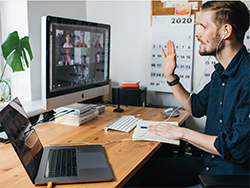 Much has been written about the speed and agility with which companies around the world moved entire workforces to remote working almost overnight. But will these more flexible and remote working practices remain once the crisis is over and the world returns to some semblance of normality?
Much has been written about the speed and agility with which companies around the world moved entire workforces to remote working almost overnight. But will these more flexible and remote working practices remain once the crisis is over and the world returns to some semblance of normality?
When the world went into lockdown in March, nearly all knowledge-based businesses shifted almost overnight to fully dispersed workforces. Staff all around the world created makeshift offices in their kitchens or bedrooms, propping up their laptops to resume office life via video conferencing.
It’s been a massive transition. Remote working has been on the rise for years, but suddenly every company has been forced to truly embrace a fully remote workforce. “We’ve seen two years’ worth of digital transformation in two months,” Microsoft CEO Satya Nadella said in April.
Lockdown has catapulted the workplace into the future: we’re realising that it’s perfectly possible to do business remotely, and be productive colleagues, while working from home.
And the challenges haven’t just been practical. Companies have also had to manage the emotional and mental health impacts of the huge transition.
“The technology of remote working and cloud-based computing has been around for years,” says Chris Clark, Founder and CEO of technology consultancy Prosperity 24/7 in Jersey. “The mental and the cultural impact – that’s where people have been struggling.”
So, how will recent experiences change the workplace once lockdown is over and companies no longer ‘have to’ allow their employees to work remotely? Will remote working continue – and how will firms manage the impact on their employees?
Change of emphasis
Work used to be seen as a place we went to. However, for those working primarily on computers at least, it’s increasingly becoming ‘a thing we do’.
Olly Duquemin, CEO of technology outsourcing specialist Resolution IT in Guernsey, says lockdown has forced businesses to speed up the journey to embracing digital technology.
“We’ve definitely seen an increase in people wanting to digitise their processes,” he says. “That cultural change has happened very quickly because it’s had to. In the past, there might have been more resistance.”
Duquemin says he’s seen an increase of digital workflows, conference calls and digital transformation processes, all of which are necessary for people to work efficiently from home.
While some of this has made companies more efficient, coronavirus has also been a harsh teacher. For many, the experiment in mass remote working has been hampered by the mental stress of dealing with a dangerous illness and isolating from friends and family.
And for parents having to handle childcare and schooling alongside their jobs, lockdown has meant having to adapt to untraditional working hours.
That’s something that has been difficult to implement on a large scale in offices in the past, but perhaps lockdown will prove that people can be trusted with such freedom and flexibility.
Duquemin expects staff will want to keep some of that flexibility after lockdown. “Leaders and organisations can see that people can be fairly efficient and continue to do their jobs well, provided they have the right technology in place. So why not?”
Clark at Prosperity 24/7 believes remote working could also make it easier for businesses to measure productivity.
“There’s far more scrutiny on outcomes in this new world,” he says. “People who are unproductive may have been able to ‘hide’ in the office environment – you may have been the cool person to chat to at the coffee machine, for instance, and able to hide in plain sight.”
But getting by on charm isn’t possible when everyone is remote, he adds. “The people who are productive are being recognised far more easily.”
Improved facilities for – and acceptance of – remote workers could also be a positive for locations suffering from skills shortages. The change of emphasis will allow businesses in areas requiring specific skills or sector knowledge, such as the Channel Islands, to hire experts from elsewhere and have them work remotely.
 Death of the business trip?
Death of the business trip?
The coronavirus pandemic also led to the cancellation of 99% of business trips by European companies in April, according to a survey by the Global Business Travel Association.
In the face of 14-day quarantines and restrictions on movement, video conferencing has become the ‘go to’ method of meeting and will likely replace travel for some time to come.
While the loss of face-to-face contact is a concern for many in relationship-led businesses, others are reporting that clients are ‘more available’ now, in part because they’re saving so much time by staying put themselves.
“We’ve had to embrace different ways to communicate,” says Brian Carey, Director of Private Wealth at Intertrust in Jersey. Carey is accustomed to frequent travel to the UK, Europe and the Middle East, but since lockdown, he has relied on video, phone calls and email.
“You have to follow up with different methods of communication to ensure you’re all communicating and [understanding] what the expectations are,” he says.
Until we know more about how the aviation industry will handle social distancing, it’s difficult to speculate on the future of business travel. But, says Carey: “I don’t think travelling is going to be as intense as before. People are becoming accustomed to seeing faces on screens and having a conversation in that manner.
“While the methods may be different, the culture of business meetings remains much the same. It’s still very much a face-to-face conversation.”
Frequent business travel can also be mentally and physically taxing, as many studies have demonstrated. So, do we really need to do all that travelling? Will this be the moment that we strip back the ‘show’ of travelling half way round the world to shake hands with a business partner and simply put the meeting agenda first?
“Some of the meetings we’re now having remotely are having the same impact, if not a better impact,” says Nick Vermeulen, Partner, Innovation and Technology, at PwC Channel Islands, who is based in Guernsey. “You look at it and think: ‘Does it actually make sense to travel so much?’. At least for internal meetings, with people you already know, it may not.”
You can get a lot done over video when you have to, says Vermeulen – PwC is currently holding a series of remote client pitches, and a new staff member hired after lockdown began completed their entire onboarding remotely.
However, as Vermeulen points out: “Most of the business stuff, you can do remotely – but it can be difficult to be empathetic over video.” He believes people will still want to “sit down in person together, at least occasionally”.
Into the unknown
The lockdown has forced companies into realisations they might otherwise never have made, some of which could be revolutionary in the move towards flexible working.
Barclays CEO Jes Staley said in April that “the notion of putting 7,000 people in a building may be a thing of the past”.
Vermeulen agrees that there will be a rethink of the physical office space. “Hopefully you’ll still have an office, but the shape of it will be different, and what you actually do there might be different,” he says. “The office may become a place for meetings and client encounters rather than a default place to just sit.”
Zedra Global Head of Legal and Compliance Stuart Esslemont says his company has always supported flexible working, but the tendency has been for people to come into the office and work traditional hours. He expects this to change.
“For some, this has been very positive in terms of how they’ve bonded with their partners or their children by being at home,” he says.
“Once this is over, I think a lot more people will be approaching us to work from home more frequently and be in the office maybe a couple of days a week.”
Chris Clark is already considering repurposing his office space. “We’ve always been [set up] to work from anywhere, and we have a high ratio of meeting rooms to workspace,” he says. “But we’re now talking about possibly converting more space so it can become a hub for collaboration.”
As the world starts to open up again post-lockdown, some of the new habits from this era of enforced home-working are likely to become permanent.
Now that we know it’s possible to have a little more flexibility and still be productive, it will be hard to argue against making that permanent.
 Teambuilding at a distance
Teambuilding at a distance
With remote working removing office interaction, and in some cases putting pressure on employees’ mental health, many companies have ramped up their teambuilding and ‘all staff’ social activities – moving them online instead.
From virtual coffees to staff quizzes, online drinks and even remote karaoke, companies have realised there’s a need to maintain team camaraderie.
The 500 employees of active wealth, corporate and fund services provider Zedra even had the opportunity to cook alongside master chefs in a company-wide initiative.
“Staff wellbeing is important during a crisis such as this pandemic, and we have to manage that and not just look at productivity,” says Stuart Esslemont, Global Head of Legal and Compliance at Zedra in Jersey.